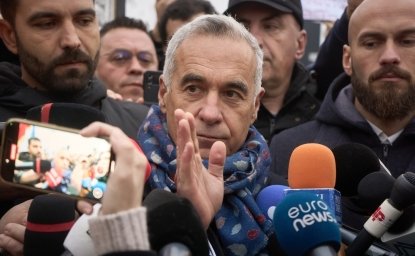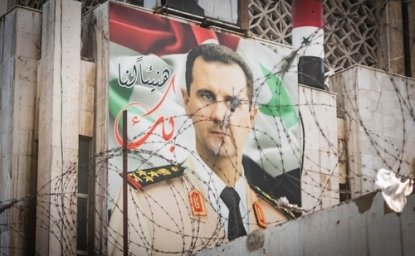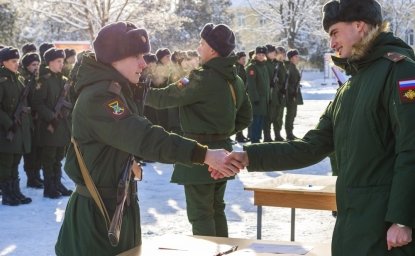
A blog of the Kennan Institute
Fifteen years of UN efforts to effectively monitor sanctions enforcement on North Korea over its nuclear and ballistic missile programs were undermined by a Russian veto at the March 28 meeting of the UN Security Council (UNSC). The veto killed an annual extension of the UN-mandated panel of experts monitoring compliance with the sanctions imposed on North Korea. Russia’s veto will not end the UN sanctions regime on North Korea. It will, however, signal an end to international consensus on the North’s nuclear weapons program and allow North Korea to more effectively flaunt noncompliance.
The veto immediately followed a three-day visit to Pyongyang by Sergei Naryshkin, the head of Russia's Foreign Intelligence Service. The combination of the two events illustrates how quickly relations between the two countries have improved, how Russia has changed its conception of its security interests, and how comfortable Putin has become undermining the pillars of global stability.
The Newest Axis of Autocrats
Naryshkin was just the latest top-ranking Russian official to visit North Korea in the past year. Russia’s diplomatic visits to North Korea began in the summer of 2023 in a search for new partners to break through continued international isolation and frustration on the battlefield in Ukraine. North Korea, itself experiencing heightened tensions with the U.S., South Korea, and Japan, the direct result of a record number of missile tests in 2022, eagerly reciprocated Russia’s overtures.
The first high-level outreach between the two countries began in July, with Russian defense minister Sergei Shoigu meeting with North Korean leaders in Pyongyang. The visit marked the first time in thirty-two years that a Russian defense minister had visited North Korea. There, Shoigu attended a military parade as a guest of honor alongside his Chinese counterpart. He also toured North Korea’s Weapons and Equipment Exhibition. There he viewed the North’s largest nuclear-capable intercontinental ballistic missiles (ICBM), including the new Hwasong-18, an ICBM capable of reaching targets anywhere in the continental U.S.
A visit by North Korean leader Kim Jung-un to meet with Vladimir Putin in Russia’s far east followed in September. The meeting between the two leaders came a month after the historic Spirit of Camp David Summit cemented closer trilateral cooperation between the U.S., South Korea, and Japan. Kim’s visit to Russia included a tour of the Vostochny Cosmodrome and Soyuz-2 rocket launch facility. There Putin signaled Russia’s willingness to assist North Korea in its ventures in “space” and “rocketry.”
Several other visits by high-level delegations followed in the months between Kim’s trip to Russia and Naryshkin’s recent visit to Pyongyang. They included a visit by Russian foreign minister Sergei Lavrov to North Korea in October and a meeting between Putin and North Korean foreign minister Choe Son Hui in Moscow in January 2024.
Weapons and Technology Exchange
Evidence of Russian technical assistance to North Korea and substantial North Korean arms shipments to Russia has been accumulating since their high-level correspondences. Some estimates suggest that Russia’s overtures to North Korea have resulted in the receipt of as many as three million artillery shells from North Korea, equivalent to an entire year’s worth of Russian shell production at its current rate.
North Korea has also armed Russia with other major weapons systems, notably its own variant of short-range ballistic missiles, the Hwasong-11. The total number of these missiles provided is still unclear, but some reports indicate that Russia has fired at least twenty of these missiles into Ukraine since December 2023. More North Korean missiles are likely on the way. Russia’s UNSC veto was preceded by undisclosed late-night flights between Vladivostok and North Korea on March 21 by Russian government Antonov An-124 cargo planes linked with previous shipments of ballistic missiles.
What North Korea has gotten in return from Russia is less clear. Russia’s decision to undermine the UN sanctions regime on North Korea has made understanding this side of cooperation more urgent. Some recent troubling indicators suggest that Russia has started providing technical assistance to North Korea to advance its missile programs.
In November, just two months after Kim’s visit to Russia, North Korea completed its first successful launch of a domestically manufactured spy satellite. A month later, Kim announced three additional spy satellite launches to follow in 2024. In January, North Korea test-fired new Pulhwasal-3-31 submarine launched cruise missiles into the Sea of Japan while Russian warships sailed past the southernmost Japanese islands. Recent unusual activity at the Sohae Satellite Launching Station suggests the next satellite launch may come in April, a month of major holidays in North Korea.
The Most Dangerous Outcomes
The UN sanctions program was implemented to create major obstacles to North Korea’s development of advanced nuclear weapons and delivery platforms. The great fear raised by Russia’s veto is that it may follow the path of recent symbolic gestures and directly signal an intention to cooperate more directly on more sensitive areas of North Korea’s weapons development.
Russia has thus far wisely seen nuclear proliferation as a threat to its broader interests. Still, the possibility Russia is changing its conception of its national interests should not be discounted. Russia has reoriented its foreign policy since the invasion of Ukraine. Russian leaders have engaged in highly provocative nuclear threats of their own and have apparently seriously considered using nonstrategic nuclear weapons in Ukraine. Hawkish Russian strategists such as Sergei Karaganov have recently pushed the idea that some nuclear proliferation may be an acceptable inevitability to create a multipolar world if managed proactively.
It’s not clear what weapons development assistance Russia is willing to offer, but a plausible and particularly dangerous path it could take would entail providing technical cooperation on advanced but dated delivery systems for nuclear weapons. One technology that fits these criteria is multiple independently targeted reentry vehicles (MIRVs) for North Korean ICBMs. MIRVs are an older technology that Russia has long mastered, and one that has thus far remained out of reach for North Korea. A single North Korean ICBM equipped with MIRVs would be able to deliver a series of small independent nuclear warheads to a range of different targets at once. If developed, MIRVs would rapidly degrade the U.S.’s ability to defend against a North Korean nuclear strike on the U.S. homeland.
An increased threat to the U.S. homeland by North Korean nukes could have a destabilizing impact on U.S. extended deterrence over South Korea. Heightened U.S. fears about sacrificing American cities to defend South Korea could fuel doubts in Seoul about America’s willingness to defend it against an attack from the North. Skepticism about American nuclear guarantees could spark a renewed push by South Korea to develop its own nuclear deterrent. Raising pressure on the U.S.-South Korean relationship in a broader effort to probe America’s alliance system for weaknesses at a time of increasing isolationist sentiment may be an end Russia is exploring in its renewed cooperation with North Korea.
The opinions expressed in this article are those solely of the author and do not reflect the views of the Kennan Institute.
Author


Kennan Institute
The Kennan Institute is the premier US center for advanced research on Eurasia and the oldest and largest regional program at the Woodrow Wilson International Center for Scholars. The Kennan Institute is committed to improving American understanding of Russia, Ukraine, Central Asia, the South Caucasus, and the surrounding region though research and exchange. Read more


Hyundai Motor-Korea Foundation Center for Korean History and Public Policy
The Center for Korean History and Public Policy was established in 2015 with the generous support of the Hyundai Motor Company and the Korea Foundation to provide a coherent, long-term platform for improving historical understanding of Korea and informing the public policy debate on the Korean peninsula in the United States and beyond. Read more

Explore More in The Russia File
Browse The Russia File
In Search of Russia’s Digital Trace in Romania’s Political Crisis

With Syria’s Collapse Russia’s Regional Power Play Disintegrates

Putin's Strategy Tests Europe's Defense Limits

